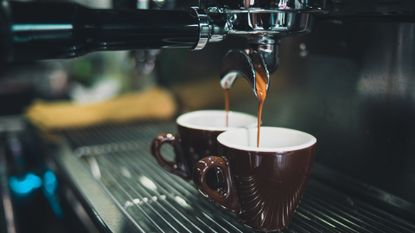

Various types of machine or gizmo may lay claim to the title of best coffee maker, but for most Europeans nothing compares to a hit of good strong espresso. And for that you want the best espresso maker you can buy, whether you favour a plain shot, cappuccino, latte or macchiato.
Yes, espresso machines may be a little more difficult to use than your average Nespresso machine or any of the entries in our best pod coffee machine guide. And yes they are also a touch more expensive. The results, however, are usually much more satisfying. Everyone in Europe knows it, Finland and Sweden – the world’s biggest coffee consumers – certainly know it, and word is getting out even in America, homeland of the pour over coffee machine.
Trouble is, there’s a bewildering plethora of espresso machines out there and that presents a daunting challenge for anyone wishing to narrow the shopping list down to just a handful of machines.
Luckily, we've got everything in this guide from top-quality domestic and manually operated hand-pump machines to larger, semi-pro behemoths. There's even a portable or two knocking about for those for whom nothing but the real thing will do, even when far away from home.
It's also worth noting that the best bean to cup coffee machines are also, in effect espresso makers with a coffee grinder and milk frother attached to them, so don't rule out one of those big kitchen beasts. Alternatively, opt for the best capsule espresso machine if you prefer the lazy and cheap option – nothing wrong with that!
The best espresso machines to buy today in 2025
Why you can trust T3
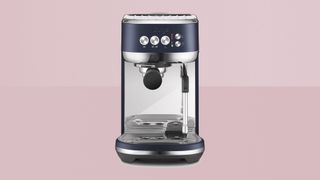

Specifications
Reasons to buy
Reasons to avoid
You may have noticed while perusing this website that we’re rather keen on Sage coffee machines. That should come as no surprise since pretty much all of their appliances are expertly built using top-quality materials and the majority are designed to operate with as little fuss as possible. Just like this compact manual espresso machine.
Measuring a petite 32 x 31 x 20cm, the Bambino Plus comes with a removable 1.9-litre water tank for easy filling, an automatic steam wand and a simple three-button interface: two buttons for one- and two-cup extractions, and another for the steam wand. Two more buttons to the right operate the temperature for the milk (using a sensor) and the texture of the froth. The whole shebang heats up in just three seconds. Yes, that’s right, just three seconds from start up to your first caffeine hit.
Some manual espresso machines require a degree in chemistry and physics but not this little titan. There’s no faffing about with levers, extraction times and water pressures here me hearties; just load the 54mm portafilter with some finely ground espresso coffee (it holds 19 grams if you really must know), twist it into the group head and press a button. Boom, instant deep, rich espresso with full luxurious crema – just as we like it.
If we were to niggle, it would be the lack of an espresso cup shelf. By not having one, the coffee splashes into the cup below and if the cup is extra small and narrow, one side of the portafilter stream misses the cup completely. It’s a strange oversight, to be sure, but it’s the only negative thing we can think of on a machine that otherwise truly excels.
The Bambino Plus is available in five colours – stainless steel, black, grey, off white and a wonderful Damson Blue – and comes with a two-year ‘Repair, Replace or Refund’ guarantee. If you’re in the market for a hassle-free manual espresso maker that delivers the goods quickly and consistently then bung this beauty on the list.
Now read our full review of the Sage The Bambino Plus
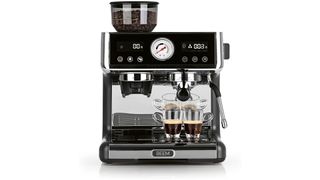

2. Beem Espresso Grind Expert
Specifications
Reasons to buy
Reasons to avoid
If you struggle to get a decent espresso out of a manual machine, you might want to try this new model from German company Beem which comes with its own grinder, 15 bars of pressure, an integrated milk frother and two thermoblocks so you can make an espresso while frothing milk at the same time. At a smidgeon under £400, it’s one of the most intuitive models available and it produces excellent café-style espressos, cappuccinos and lattes with almost zero fuss.
We have already reviewed this model’s slightly cheaper stablemate, the Beem Grind Profession, but this one improves on it by dint of a pair of digital displays that provide the user with adjustable extraction countdown and a similar time clock for grinding.
The Beem Espresso Grind Expert comes with its own 250g built-in grinder with 30 grind levels, a huge 2.8-litre water container, a professional non-pressurised twin-spout portafilter with two baskets for single and double espressos, and a gloriously weighty 388g tamper that is a joy to use.
A key element of this espresso machine is the large pressure dial on the front fascia. Simply ensure that the needle is as close to centre as possible when hitting your preferred extraction button – there are two, one for single shots and another for doubles – and chances are you’ll create the espresso of your dreams. It really is that simple. And if you prefer milk with your coffee, there’s a top-tier frothing wand to the right (the product ships with a stainless steel milk jug). Incidentally, if you create a lot of mess emptying the portafilter of used grounds, consider purchasing a Beem knockbox for Portafilter which makes the process a lot let messy.
I tested the Espresso Grind Expert using my new favourite beans – the deliciously chocolaty Quarta Caffè Barocco blend – and the results hit all the right notes. Crema was deep and silky and the flavour had oodles of clout, just like a barista bar.
Despite the surfeit of plastic, this keenly-priced model comes highly recommended. It’s easy to use, attractively styled and it produces top-quality shots that will make you the toast of the neighbourhood.
Now read our full review of the non-digital version, the Beem Espresso Grind Profession
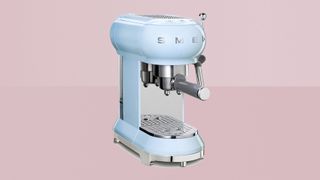

3. Smeg ECF01
Specifications
Reasons to buy
Reasons to avoid
This tall-standing, gorgeous hunk of quintessential Smeggishness is just the ticket for those who love a bit of retro in their Hampstead kitchen.
To say it’s easy to use is an understatement. Just load up the pleasingly weighty stainless steel portafilter with your favourite espresso blend, tap one of the cup buttons and either leave it to complete a predetermined measure of water or stand over it with a stopwatch and press the button to stop it manually, on exactly 27.5 seconds (or whatever your favoured extraction time may be).
The milk frother is just as simple to use though you may need to adjust the angle of the milk container to find the sweet spot. Other fine details include a one-litre removable water reservoir, a cup warming plate that rarely gets warm and three simple buttons: one cup, two cups and steam.
The espresso this pretty appliance produces is nothing short of marvellous. If style and design are as important as flavour when it comes to your morning coffee, get over to the John Lewis website pronto and snap one up. It's available in seven rich colours when fully stocked.
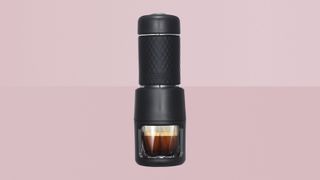

4. Staresso Basic Portable Espresso Maker
Specifications
Reasons to buy
Reasons to avoid
If you’re a fan of portable espresso makers that don’t require electricity then you’ll be very interested in this model from Staresso. In many ways it’s an even better option than our long-term favourite, the Wacaco Nanopresso, which the Staresso pips to a higher slot on this page.
The Staresso was designed for travel and you’ll thank your lucky stars you bought one next time you’re at a hotel that only serves percolated sludge or worse, instant coffee.
It measures just 20cm x 7cm, weighs 455g and is comprised of a 100ml water chamber, a small circular portafilter and an integral shatter-resistant drinking glass. Ingeniously, the Staresso also accepts Nespresso pods.
To use, simply fill the chamber with hot water, then fill the portafilter with your favourite blend or, for extra convenience and less mess, pop in a Nespresso pod. Now screw it all together and pump the silver plunger until a slim stream of rich, lip-smacking crema-topped espresso is dispensed into the cup below.
Don’t for one minute think that a portable product like this couldn’t possibly create as good an espresso as an electric machine. Given that espresso relies on simple water pressure, it doesn’t make much difference whether that water is put under pressure by an electric pump or by hand. Hence, the coffee that comes out of this dandy travel pal is every bit as rich and scrumptious as that dispensed by the majority of electric machines.
The Staresso Portable is must-have item for any travelling caffeine aficionado, especially since it also accept Nespresso pods without the need for any extra add-ons. Hotly recommended.
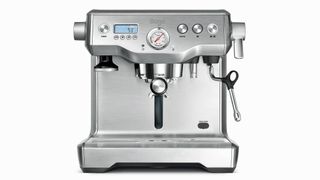

5. Sage The Dual Boiler Espresso Machine
Specifications
Reasons to buy
Reasons to avoid
A hulking brute of an appliance, in Sage's usual battleship-like brushed metal (with matching, tough plastic bits), this is a near-cube of 36x37x36cm. However, if your kitchen can take it – hey, it's almost compact in comparison to the brand's bean-to-cup behemoths – you should seriously consider one.
The great thing about Sage's best coffee makers is that they look, act and feel like professional machines. However, your dirty secret is that the delicious coffee they produce is not down to your skills as a barista; clever electronics and well engineered components are taking the guesswork out of it for you.
The Dual Boiler, as its name suggests, has two boilers. There's one for steaming the milk and one for making the coffee, so you can do both at once. If you don't run a coffee shop or have a large household full of caffeine fiends who all need their fix at the same time each morning, that is arguably not very useful.
However, the brace of boilers also allows more consistent water temperature for your beverage, which means it tastes better. Coffee making is a precision art, but the Dual Boiler makes it pretty simple.
There are manual settings you can play with as well, so if you want to experiment and develop some real barista skills, the Dual Boiler is still a top choice.
As you'd expect for its premium price, the Dual Boiler comes with a very good tamper, is easy to clean (although not so easy to descale; another good reason to use filtered water) and gives the impression that, if maintained properly, it ought to last forever.
The milk frother works well enough but unlike some of the newer Sage machines, it isn't fully automated, and while it's fine for lattes, you may find you struggle to get milk to the denser consistency required for cappuccino. You could always add one of the best milk frothers to your setup, I suppose…
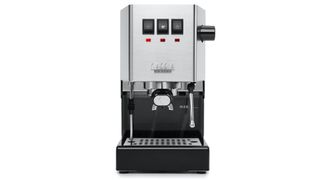

6. Gaggia Classic
Specifications
Reasons to buy
Reasons to avoid
The Gaggia Classic brings a slice of Shoreditch to your kitchenette. Given that Gaggia pretty much invented the espresso, we think it’s safe to say the Italian company knows a thing or two about the subject. The newly revamped Classic is built to near commercial standards and constructed almost entirely out of stainless steel, including the boiler. At 38cm tall, it will still easily fit the space between the kitchen worktop and the wall units.
Whether you like an industrial-looking machine on your kitchen worktop is up to you, but what can’t be argued with is the quality of its espresso. Despite the noise, this thing makes a sensational cup of black gold with a deep, almost Guinness-like crema.
You thankfully don’t need a degree in baristaology to operate it either, since it comes with just three industrial-size buttons: one to turn it on and off, another for the coffee and a third for the steam wand. You will, however, need to stop the extraction process yourself.
The Gaggia Classic is a cracking espresso maker that is easy enough for even the most tech illiterate user to get a handle on.
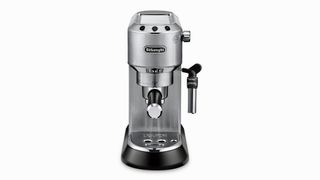

7. De'Longhi Dedica Style
Specifications
Reasons to buy
Reasons to avoid
The Delonghi Dedica is a slim, handsome looker that produces exquisite espressos, cappuccinos and lattes with the push of a button. Simply fill the portafilter, press one cup or two, and it extracts an excellent brew with very little fuss. Or at least, it does once you dispense with the fairly terrible tamper that the Dedica comes with and invest in something a little more heavyweight. You'll also need to experiment with what size dose of coffee to use, but this is soon mastered after a few experiments.
The steam wands on cheaper espresso machines are often terrible, and the wand on this one doesn't at first appear very promising, but with a little practice, it can actually turn out very nicely textured milk to service your latte or cappuccino needs. If you don’t fancy spending too much on a manual espresso machine, the Delonghi Dedica is an excellent choice.
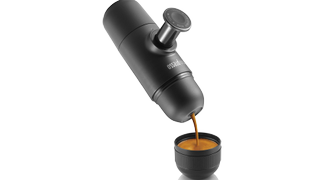

8. Wacaco Minipresso GR
Specifications
Reasons to buy
Reasons to avoid
If you’re a travelling espresso junkie who can’t function without a decent caffeine hit, try this little portable lifesaver. The cylindrical Minipresso measures just 18cm x 5cm and comes with everything you need to make a genuinely creamy espresso.
Just add hot water and a scoop of fine-ground blend and slowly squeeze the piston for an unexpectedly rich, aromatic espresso as good as the majority of machines on this page. And that’s no exaggeration. It’s made from seemingly unbreakable plastic, too, so it should stand up to a lot of knocks.
If hotel coffee rarely meets your high expectations or you’re stuck out in the wilds, pop one of these in the shoulder bag and you’ll never be without a proper caffeine fix again.
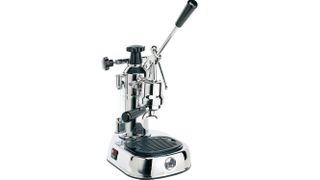

9. La Pavoni Europiccola
Specifications
Reasons to buy
Reasons to avoid
If you truly believe espresso making is an art form, this debonair cast brass and chromium-plated machine is for you. Unlike most domestic computer-controlled espresso makers that use pre-programmed presets to determine the right levels of extraction time and pressure, this one is a back-to-basics manual job that involves a bit of elbow grease.
The concept is simple enough: a lift of the lever raises a piston that allows water under pressure to infuse the coffee in the filter holder. When you pull back down on the lever, the piston forces the water through the coffee and into the cup. The knack here – and it’s very trial and error – is to vary the speed at which the water passes through the coffee. The slower you pull, the stronger the brew.
This imposing workhorse is capable of producing up to eight consecutive top-flight espressos at a time and will even whip up a semi-automatic cappuccino. By which time your biceps will resemble a tree trunk.
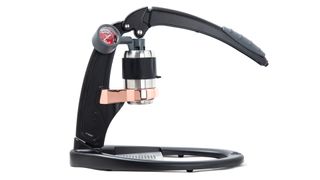
10. Flair Pro 2
Reasons to buy
Reasons to avoid
This aesthetically pleasing manual espresso maker doesn’t require electricity to work, just access to some hot water. Like the manual Pavoni machine we review above, the Flair Pro 2 requires muscle power to pull a shot and a really good dose of trial and error during initial use.
Don’t even consider using this shot puller with packaged pre-ground coffee (even those labelled espresso) because the grounds mostly likely won’t be fine enough and when you come to pull down the handle, the piston will have almost zero resistance and all you’ll get is a cup of black dishwater.
The folks at Flair suggested I try the Niche Zero coffee grinder which is the grinder of choice among baristas (it grinds coffee all the way down to talcum powder consistency). After a few experimental grinding sessions I eventually found the perfect consistency for the Flair and, after four attempts in total, finally extracted an espresso that looked as appealing as those on the numerous demonstration videos I’d seen. Granted, the learning curve with this model is steep but once you’ve got it dialled, you’ll be pulling shots till the cows come home.
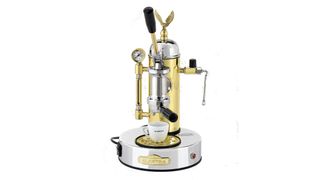

11. ELEKTRA MICRO CASA LEVER S1
Specifications
Reasons to buy
Reasons to avoid
Constructed almost entirely out of beautifully polished chrome and brass, this manually-operated Italian model is as much a style statement as it is an espresso machine.
Admittedly, the process required to make an espresso is so complex – and slow – that it’ll likely take you a number of attempts before you achieve a perfect extraction, but we assume you'll put in the effort having stumped up the readies in the first place.
From base to eagle, this model stands nearly half a metre in height, if you count the lever. It's 25cm in diameter, so despite ‘Micro' in the name, it is not very 'micro' at all. All that metal work gets scalding hot too, so maybe avoid this machine if you have small kids who can reach the worktop. I don't know why I even say that; nobody with kids would buy this, unless their job description is 'dictator of small country with large oil reserves’.
Aside from the complexities of the coffee-making process itself, lever-based machines of this nature don’t appreciate having their portafilters removed immediately after extraction. You have to wait a few minutes for the pressure to equalise or the contents of the portafilter – and some very hot water – could be disgorged over you in a rather discomforting manner.
If you can handle the steep learning curve and don't mind having a crazy, chrome, eagle-topped gizmo in your kitchen, you won’t be disappointed. This barista-spec machine is not only a 'striking conversation piece' (or 'explosion in a bad-taste factory', depending on your aesthetic sensibilities), it also happens to produce a flavourful espresso with bags of silky crema.
How to buy the best espresso maker for you

Despite the modern trend for bean-to-cup and capsule based machines, there’s definitely something to be said for the good old 'manual' espresso maker.
Their portafilters (the metal container you press the ground coffee into) may require regular emptying and cleaning, and the extraction time is usually down to you rather than being automatically set, but the process is so easy to get to grips with, you’ll seldom need to refer to the instruction manual.
Moreover, manual machines are likely to be more reliable than the capsule or bean-to-cup variety simply because there are fewer things to go wrong with them.
If you want a richly aromatic espresso, cappuccino or latte and require at least a modicum of help from the machine itself, try the stunning Sage Bambino Plus, its higher-end stablemate, the Sage Dual Boiler, the newer Beem Espresso Grind Expert, the Smeg ECF01 or Gaggia's more affordable Classic. All these machines excel at making rich aromatic espressos every bit as good as those served in any decent European café.
If you’re a wannabe barista who is keen to sample the complex science behind the art of manual espresso pulling, consider a hand-operated machine like the popular La Pavoni Europiccol or the extraordinary, if much more complex, Elektra Microcasa Lever S1.
Most of these machines do much of the work for you, but they need the best ingredients, and they do require maintenance. Especially if you're in a hard water area the Number One, top tip of ALL time is to use filtered water. Even if the machine has a filter built in (they never seem quite as effective as a filter jug). You'll be amazed at how much better the coffee tastes, and you won't need to descale anywhere near as frequently.
The other Top Tip of ALL time is to use good quality, freshly ground beans or, if you don't want to splash out on a grinder, at least keep your pre-ground stuff in a screw-top jar in a dark and cool cupboard (but not the fridge). Whether using beans or ground, your mission is to always try to polish it all off as quickly as possible, as even under ideal storage conditions, it degrades rapidly as soon as the vacuum seal on the bag is opened.
And you know what the best way to get through bags of coffee rapidly is? Buy the best espresso machine, so making great coffee is an easy and pleasurable experience.
Sign up to the T3 newsletter for smarter living straight to your inbox
Get all the latest news, reviews, deals and buying guides on gorgeous tech, home and active products from the T3 experts
Derek (aka Delbert, Delvis, Delphinium, Delboy etc) specialises in home and outdoor wares, from coffee machines, white appliances and vacs to drones, garden gear and BBQs. He has been writing for more years than anyone can remember, starting at the legendary Time Out magazine – the original, London version – on a typewriter! He now writes for T3 between playing drums with his bandmates in Red Box (redboxmusic).
-
 The ‘ultimate’ total body dumbbell workout for beginners, according to a fitness expert
The ‘ultimate’ total body dumbbell workout for beginners, according to a fitness expertBuilding muscle and boosting your fitness doesn't need to be complicated, here's how you can do it at home in 20 minutes
By Bryony Firth-Bernard Published
-
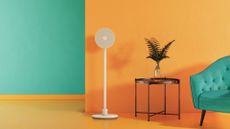 LG's new projector looks more like something IKEA would come up with
LG's new projector looks more like something IKEA would come up withAnd we mean that in a good way
By Britta O'Boyle Published
-
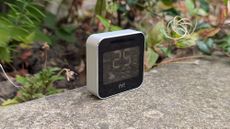 Eve Weather review: a compact, connected weather station for your smart home
Eve Weather review: a compact, connected weather station for your smart homeTemperature, humidity, and air pressure readings from your own little weather station
By David Nield Published
-
 Best personalised nutrition test 2025: find out what works for your body and why
Best personalised nutrition test 2025: find out what works for your body and whyWhich personalised nutrition tests are the best on the market? Here's our top recommendations
By Lizzie Wilmot Last updated
-
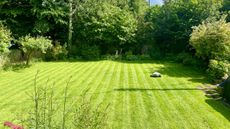 Best robot lawn mower 2025: autonomous mowers that cut the grass so you don't have to
Best robot lawn mower 2025: autonomous mowers that cut the grass so you don't have toThese are the best robotic sward scythes to keep your lawn in tip-top condition while you sit back and relax
By Derek Adams Last updated
-
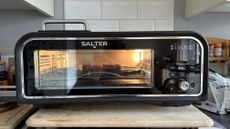 Salter RapidCook 400 Digital Air Fryer Oven review: great for steak and pizzas
Salter RapidCook 400 Digital Air Fryer Oven review: great for steak and pizzasThe Salter RapidCook 400 Digital Air Fryer Oven is big and heavy, but it’s also brilliant for cooking all sorts quickly at high heat
By Rob Clymo Published
-
 Best skincare gadgets 2025: perfect your complexion at home without the salon price tag
Best skincare gadgets 2025: perfect your complexion at home without the salon price tagThe best LED masks, facial massagers, cleansing devices and more for firmer, clearer, glowing skin
By Lizzie Wilmot Last updated
-
 Best Philips Hue lights 2025: sophisticated smart bulbs for your space
Best Philips Hue lights 2025: sophisticated smart bulbs for your spaceThe best Philips Hue lights bring state-of-the-art, remote-controlled lighting to your home
By Lizzie Wilmot Last updated
-
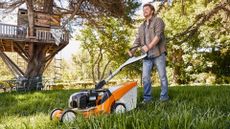 Best petrol lawn mower 2025: rugged lawn mowers for larger gardens
Best petrol lawn mower 2025: rugged lawn mowers for larger gardensTrim the sward with one of these top-rated petrol-powered lawn mowers
By Derek Adams Last updated
-
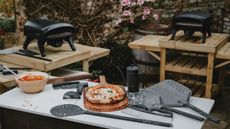 Best pizza ovens 2025: enjoy the crisp, crunch and gooeyness of freshly-baked pizza
Best pizza ovens 2025: enjoy the crisp, crunch and gooeyness of freshly-baked pizzaFind the best indoor and outdoor domestic pizza ovens to make your al fresco bash go off without a hitch
By Derek Adams Last updated